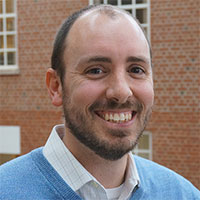Kate B. Reynolds Charitable Trust funds collaborative UNC project to address substance misuse in NC’s McDowell County
December 12, 2018
The Community Assessment and Strategy team at the North Carolina Institute for Public Health (NCIPH), housed in the UNC-Chapel Hill Gillings School of Global Public Health, has been awarded funding from the Kate B. Reynolds Charitable Trust to help reduce substance misuse in McDowell County, North Carolina.
Amy Belflower Thomas, MHA, MSPH, CPH, NCIPH director of community assessment and strategy, and John Wallace, PhD, NCIPH senior data adviser, will serve as co-investigators for the three-year, $273,483 project.
“We are honored to continue to receive support to work directly with local communities in North Carolina that have been impacted by tremendous health challenges such as the opioid epidemic,” Belflower Thomas said.
McDowell County is part of Healthy Places NC, the Kate B. Reynolds Charitable Trust’s long-term, community-driven initiative to improve health in up to 10 rural North Carolina counties. Substance misuse is one of the primary health issues McDowell residents have identified to address in the coming years.
The NCIPH team will collaborate with the McDowell County Substance Misuse Workgroup, established in response to the recent surge of drug poisoning morbidity and mortality. The team will seek to identify needs and gaps in service provision, identify priorities and evidence-based strategies for behavioral health improvement, and develop resources and training to inform and support these initiatives.
Recognizing that substance misuse is often a result of behavioral health needs, structural and historical oppression, and poverty, the project will examine substance misuse in conjunction with available behavioral health services and the broader context of social determinants of health.
The overall magnitude of substance misuse disorders is unknown, but in 2016, the rate of medication and drug poisoning deaths in McDowell County was more than twice that of the state as a whole. The goal of the project is to reduce the rates of substance misuse and overdose deaths, and team members will leverage ongoing efforts by community coalitions and behavioral health providers.
“Our team looks forward to working with partners in McDowell County, who already do great work to address the immediate needs of those affected,” Wallace said. Together, we’ll implement data-informed tools and strategies that will help them also plan for prevention and long-term solutions.”
NCIPH partners in the project with the North Carolina Center for Health and Wellness (NCCHW) at the University of North Carolina at Asheville. The work builds upon other collaborations between the UNC Gillings School and UNC Asheville, including the new UNC Gillings MPH Program in Asheville.
“This is a fantastic opportunity for us to partner with NCIPH to make a difference in substance misuse and mental health in McDowell County,” said Amy Joy Lanou, PhD, NCCHW executive director.
Emma Olson, MSW, MPH, NCCHW interim director of partnerships and evaluation, noted that substance misuse and mental health challenges are two of the most important issues facing North Carolina communities.
”These two issues contribute to thousands of unnecessary deaths and connect to so many other health conditions and social determinants,” Olson said. “We are grateful for the opportunity to partner with such a powerful team to try to address the root causes and identify solutions that may help not only those in McDowell County, but others across the state.”
______________________
The grant from the Kate B. Reynolds Charitable Trust supporting the project is a part of For All Kind: the Campaign for Carolina. The University’s historic $4.25 billion fundraising campaign is inspired by the Blueprint for Next, Carolina’s overall strategic framework built on two core strategies: “of the public, for the public” and “innovation made fundamental.”
The Kate B. Reynolds Charitable Trust was established in 1947 and is now one of the largest private trusts in North Carolina. Its mission is to improve the health and quality of life of financially disadvantaged residents in North Carolina. The Health Improvement in North Carolina program area supports community-wide health solutions across the state. The Local Impact in Forsyth County program area fosters equitable and sustainable solutions to improve the quality of life in Forsyth County. Wells Fargo Bank, N.A., serves as sole trustee. Learn more.
Since 1999, the UNC Gillings School of Global Public Health’s North Carolina Institute for Public Health (NCIPH) has served as a bridge between academia and public health practice partners including state and local public health agencies, health care and community organizations. With a mission to “bridge knowledge and expertise at the UNC Gillings School by facilitating collaborative solutions to population health challenges in North Carolina and beyond,” NCIPH serves as a resource for public health professionals across the state, region and country. Learn more.
The North Carolina Center for Health and Wellness (NCCHW), established in 2010 to support health equity across the state, aims to impact policy, build capacity and ignite community initiatives by working through a web of cross-sector relationships organized around building healthier places throughout the state. Staff members broker ideas, champion projects and collect results about how to produce health at the population level. Learn more.
Contact the Gillings School of Global Public Health communications team at sphcomm@listserv.unc.edu.


